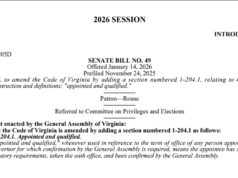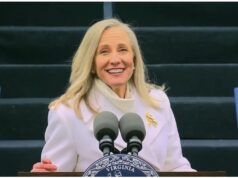by John Seymour, a long-time resident of Arlington County and a precinct captain with the Arlington County Democratic Committee.
This May, as in prior years, the Arlington County Democratic Committee is scheduled to hold a caucus to choose a School Board candidate for the November general election. Barbara Kanninen, the widely-respected current Chair of the School Board and its most experienced member, recently announced that she will not seek another term. With Ms. Kanninen’s departure — which extends an exodus begun by three other Board Members who chose not to seek re-election during the past several years — the field is wide open, though some fear that qualified candidates may be increasingly difficult to find.
School Board members are poorly paid, work long hours, and shoulder huge burdens. Responsible for a budget of $700 million and a student population of more than 25,000, the Arlington School Board must, even in the best of times, make a host of difficult decisions involving contentious and emotionally-charged issues — school closings and consolidations, boundary changes, curriculum revisions, and ways to narrow the achievement gap among socio-economic groups.
And these are most definitely not the best of times. The once sparsely-attended and almost preternaturally civil School Board meetings now sometimes resemble restive arenas, where parents and others argue about the removal of the names of Confederate heroes from school buildings , the drafting of policies promoting equity in admissions to elite public high schools, measures to protect the rights of transgender students, and decisions to remove police officers from school buildings.
And, though it seemed things could not possibly get worse, groups of parents outraged by mask and vaccine mandates, school closings during the Covid epidemic, and the teaching of historical truths about the nation’s fraught racial history, have opened entirely new fronts in the culture wars. That the School Board often has limited control over an issue is often beside the point. The local School Board is still the most visible local institution forced to confront divisive social and cultural changes in an increasingly polarized political environment.
Unsurprisingly, perhaps, into this climate of culture war skirmishes surrounding public education comes opposition to the Arlington County Democratic Committee’s long-standing caucus process and even opposition to Democratic endorsement of candidates for school boards seats. Members of the public disappointed with the policy views of prevailing Democratic candidates argue that school board elections in Virginia, as in most jurisdictions nation-wide, are intended to be non-partisan. Political parties in Virginia are prohibited from holding formal primaries in school board races or including a party affiliation on the official November ballot. Nevertheless, critics argue, the Democratic caucus and subsequent public endorsement determine, as a practical matter, the outcome of the general election in deep blue Arlington and thus render that election both superfluous and partisan. At its February meeting, Arlington Democrats will debate the issues raised by its critics and vote on whether and how to change its caucus and endorsement process.
It is certainly true that the caucus has been extraordinarily successful in promoting Democratic candidates. All current members of the School Board prevailed in the caucus, received the Democratic endorsement, and benefitted immensely from the party’s well-financed grass-roots advocacy campaigns. And the caucus process is, admittedly, not without its flaws. Some talented and well-qualified County residents are excluded from seeking the Democratic endorsement for local elections because the Hatch Act prevents federal employees from engaging in many forms of partisan political activity. Moreover, despite the party’s best efforts to sponsor and broadly publicize School Board debates at various neutral forums, turn-out in the oddly-timed and staggered local caucuses for School Board remains disappointingly low.
Despite its limitations, however, the caucus leads to endorsements that are far more democratic and participatory than those made by political leaders following candidate interviews. During the last Democratic caucus for school board, more than 6,000 Arlington citizens participated in online voting. And it would be naive to think that education policy is apolitical. It has been infused with politics for generations, from early 20th century battles over creationism and evolution, to mid-century fights over integration, busing, sex education, and school prayer, to our century’s own struggles with state control and federalism, and adoption of nationwide Common Core standards. One recent inquiry into public reaction to today’s Covid crisis found that partisan politics, far more than science, shaped school district decision-making on school re-openings.
Party vetting of candidates and public endorsement can, as critics maintain, greatly influence the election outcome. But that is as it should be. Many County residents lack the time to attend candidate debates or study candidates’ written policy positions and understandably look for a shortcut to winnow the field — the R or the D next to candidate names. Where law prohibits party designations on the official ballot, voters look to sample ballots distributed by party volunteers at every polling place, which are permitted to identify candidates by party. Most voters today likely understand that, although party labels are not perfect indicators of policy choices and partisan candidates’ positions will vary across a spectrum, the D next to a candidate’s name will signal some likely policy preferences —support for secular public education, teachers’ unions, and disproportionate funding for high-poverty schools, among other progressive positions. A school board candidate with the R next to the name will often, although not invariably, mean support for school privatization, vouchers for private and parochial schools, and the keeping of God in, and race out, of educational settings.
Democrats understand, of course, that Republicans are not blind to the importance of local elections. The right-leaning American Enterprise Institute, for example, views school boards as a potential power base for conservative thought. Its recent Conservative Education Agenda calls for abandonment of the current legislative preference for nominally non-partisan school board races and their replacement with laws that expressly allow partisan affiliation to appear next to candidates’ names. The conservative Fordham Institute also has called for overtly partisan school board races, making the commonsense and obvious point that the parties have very different views on how best to govern schools and that voters should be made aware of them. Republican controlled legislatures in Texas, Tennessee, and other states have already begun to introduce laws to change the nominally non-partisan nature of school board elections into plainly partisan ones.
Pretending that school boards and educational policy are non-partisan will not make them so. If Arlingtonians care about education – and Arlington’s regular ranking as one of the nation’s best public school systems suggests that they do – then their choices for School Board should be well-informed and based on clearly articulated values. Though imperfect, the caucus process is an essential mechanism to winnow the field of Democratic candidates. The Arlington Democrats’ subsequent endorsement and sample ballot provide critical guidance for voters at the polls. They should be retained.










![Tuesday News: Trump to Replace Greg Bovino with “Incompetent Fool” Tom Homan; Pam Bondi’s Insane Letter to Tim Walz; “Americans Know Fascism When They See It”; “Gun rights groups blast Trump over [MN] response”; New UVA President Coming?](https://bluevirginia.us/wp-content/uploads/2026/01/montage012726-100x75.jpg)
